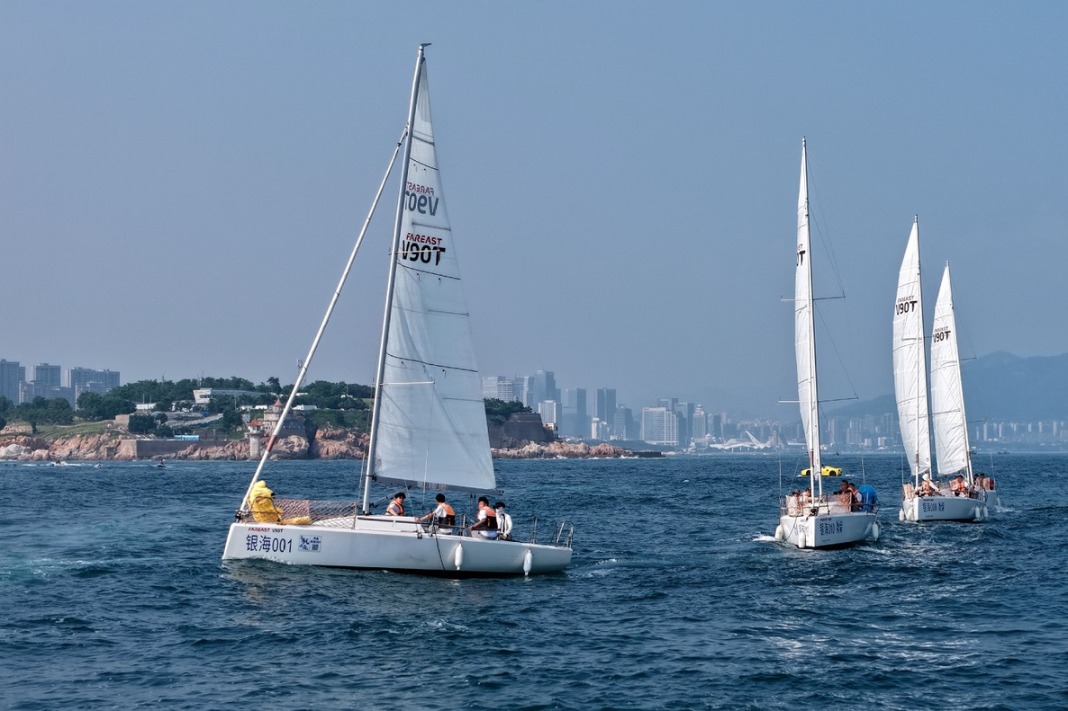Cage fisheries bow out for sake of environment

Fisherman Fan Fangzhuo said raising and harvesting fish in net cages drifting in natural waters was lucrative but had always nudged his conscience.
Like hundreds of thousands of fishermen in Guizhou province, Fan had utilized such buoyant apparatuses to scale up fishery production and income in the Qingshui River in his hometown of Jinping county.
"We flocked to buy and install net cages in waterways in the past. My net cages used to cover more than 60,000 square meters of waterway," he said. "I earned a lot but also felt like I had committed a crime against the environment."
Cage aquaculture was detrimental to the Guizhou water ecosystem because unregulated installation of net grids congested waterways and led to a phenomenon called eutrophication, which occurs when excess nutrients from residues of fish feed and excrement cause algae to bloom and block out sunlight below the water's surface.
Veteran tour boat driver Luo Qian in Xingyi city's Wanfeng Lake can still recall how painful it was to navigate through a thicket of net cages submerged in turbid waters.
"They were everywhere on the river surface. I had to be extremely careful to avoid bumping into them," he said. "Many tourists had arrived with high hopes of seeing Guizhou's picturesque landscape but ended up feeling disappointed," he said.
The issue prompted local authorities to dismantle net cages as early as 2016. About a year later, the provincial government accelerated efforts to eliminate cage aquaculture in all natural waters across Guizhou.
Also in 2017, Guizhou became one of the three provinces shortlisted by China's central government as pilot zones for ecological conservation. Guizhou, along with Fujian and Jiangxi provinces, are tasked with exploring comprehensive and effective ways to improve natural environments while creating new engines for green development.
Officials in Guizhou said the livelihoods of fishermen such as Fan, who had to abandon their main source of income, and the restoration of the pristine river ecosystem in lakes are equally important.
Jiang Kai, an official at Xingyi's Nanpanjiang township, said: "The core issue was that most net cages were placed in the water by fishermen. For them, taking them down means no income."
To buffer the impact on fishermen's lives, Jiang said, people affected received 20 yuan ($3) for each square meter of net cages being torn down. In 2018, a State-owned company was established to handle the fish in any remaining nets.
Meanwhile, excess labor from the fishery industry was diverted into new sectors that local authorities had encouraged to supplement the local economy, such as tourism and regulated in-land fisheries.
These efforts eventually paid off. Better incomes, higher business incentives and a visibly improved local environment attracted more people who used to make a living with net cages to change their ways. By the end of 2018, such fisheries in Nanpanjiang became part of history.
Across Guizhou, about 2,240 hectares of waters once used for cage aquaculture had been recovered as of September, and nearly 1.8 billion yuan in subsidies were committed to the campaign, the provincial government said.
The effect on water quality has been significant. From January to June, about 98 percent of the water in Guizhou was deemed in good condition, an increase of 3.3 percentage points from the same period in 2017.
Luo, the boat driver, compared sailing on the Wanfeng now to zipping through a highway.
"The lake is very clean now, and it's a delight to drive around," he said. "I hope water pollution will never occur again and that the lake can be as beautiful as it is now forever."
Offshore, uprooting cage aquaculture also served as a catalyst for local residents to seek opportunities in environment-friendly industries.
Fan, in Jinping county, was one of the first villagers to decide to pivot to factory fish farms. He had received 2 million yuan in subsidies for his expansive net grids, which helped him to rent a larger plant. Last year, total sales of his new business reached more than 600,000 yuan.
Fan has also started a breeding cooperative that enlisted 54 impoverished households in the county.
"The environment here is getting better and better, and villagers have started different careers," he said. "It's a win-win situation for both ecology and economy."
- Hero driver dies after saving South Korean tourists
- Gratitude poster honors Xinjiang officer who braved flood to save tourists
- Maritime Day events held in China's Hainan
- Intl symposium discusses major global earthquakes and prediction research
- Rare birds return to Dongting Lake wetlands
- Sunset paints Wuhan Ferris wheel gold




































